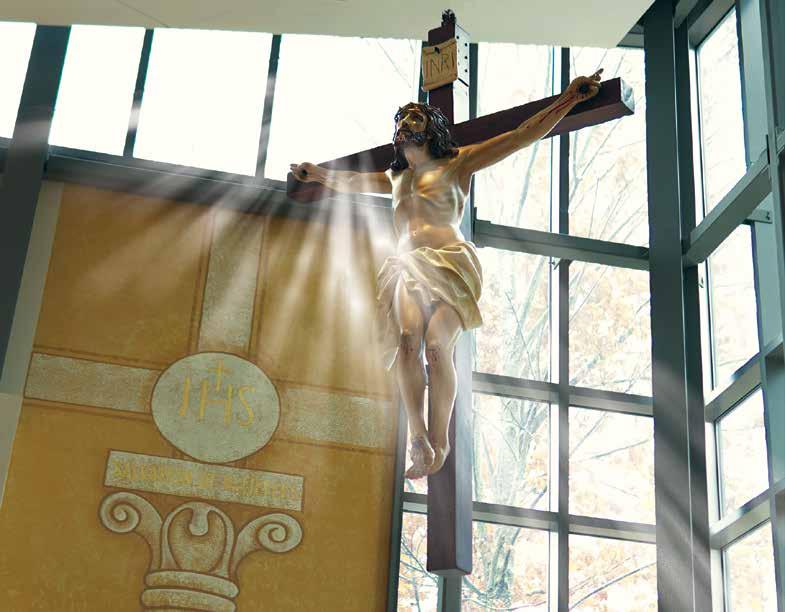
6 minute read
CROSS-GENERATIONAL FRIENDSHIP
Sister Ellie McNally, C.PP.S. and High School Student Jacob Wells Formed Lasting Bond Through Letter-Writing
BY KARY ELLEN BERGER
Advertisement
Most high school students are focused on schooling and outside activities like sports, clubs, work and various interests. For a Bishop Fenwick High School student and St. Maximillian Kolbe parishioner, one particular interest is a priority – connecting with his pen pal.
Jacob Wells’ pen pal isn’t in a different state or country. Rather, she is Sister Eleanor McNally, C.PP.S. (affectionately known as Sister Ellie) of the Sisters of the Precious Blood and 103 years young.
Their friendship began in 2019 through Wells attending Mother Teresa Catholic Elementary School in Liberty Township. The Random Acts of Kindness Club, to which he belonged, created Easter baskets for the Sisters.
“During the delivery, we played Bingo and got to know each other,” said Wells. “She asked me what I wanted to do when I grew up. I answered that I had an interest in journalism. You see, she was an English teacher at the high school and college level. She asked for my address and she wrote me a beautiful letter that uplifted me. I responded and we eventually became pen pals.”
As a child, Sister McNally lived in California, and her family moved to Arizona when she was about 10 years old. She met the Precious Blood Sisters there, in her elementary school.
“Hard to believe, but I went to the convent in Dayton straight out of the eighth grade in 1933, which means I have been in the community for 88 years,” said Sister McNally.
Sister McNally’s career and vocation combined with Wells’ passion for writing to spark a unique connection between them.

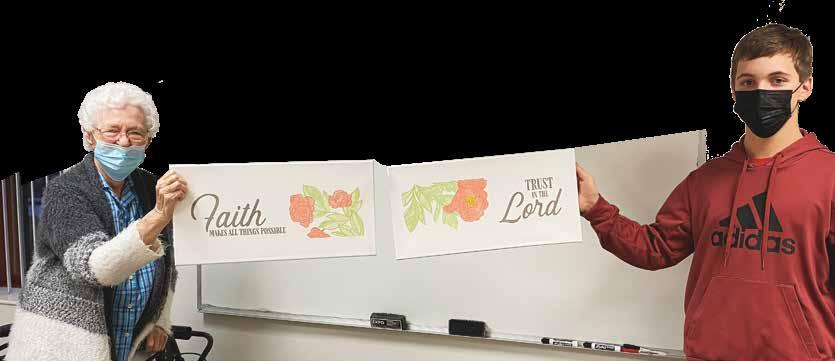
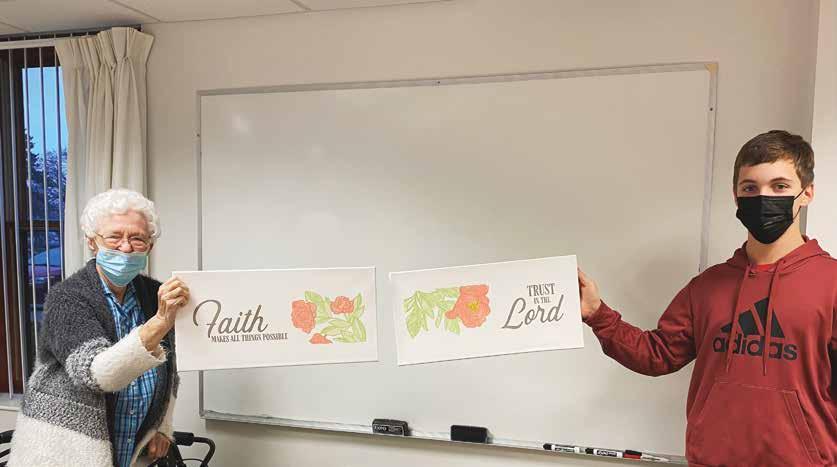
“I never would have guessed that God would bless me with something as little as an Easter basket delivery and turn it into a life-changing friendship,” shared Wells. “You would not believe how much your spirit would be uplifted if you even read a sentence of her letters. Also, replying to her letters really just helped me to reflect on my life and I was able to express recent events, feelings, thoughts, etc.”
“It fills my soul to have this friendship with Sister McNally,” continued Wells. “She is one of the few people in my life who I feel comfortable sharing my spiritual journey, questions and experiences. She is interested in my daily life and asks me about my schools, sports, friends, Boy Scouts, family and everyday life. She really cares about me and I am so grateful that God brought us together.”
“I feel very humble and grateful that a young person like Jacob finds me a person with whom he can feel comfortable as we share our own spiritual lives,” said Sister McNally. “Corresponding with Jacob has given me a lift knowing that God is still alive and working in our youth and I am privileged to experience that through Jacob. Most importantly, I have seen God’s love shine through Jacob and that touches me deeply.”
Sister McNally and Wells correspond through traditional letters, emails and visits and he recently visited for her December birthday, bringing Christmas gifts for her and the other Sisters.
He doesn’t know where his life’s path will take him, Wells said, but his connection with Sister McNally had a significant impact and he’s a better person for having her in his life.

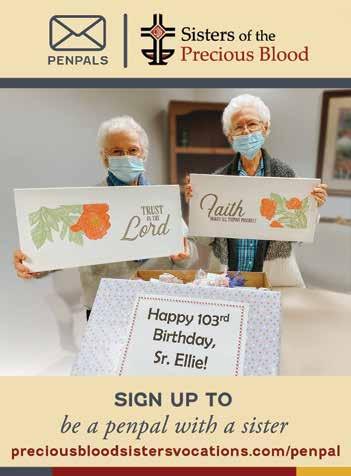
The Sisters of the Precious Blood, the Missionaries of the Precious Blood and the Adorers of the Blood of Christ announce the foundation of the Precious Blood Spirituality Institute
to let the whole world know in a new way about the redeeming, healing power of the Precious Blood of Jesus. Our world needs it.
To learn more, visit: preciousbloodsistersdayton.org cpps-preciousblood.org preciousbloodkc.org adorers.org
Missionaries of the Precious Blood
BOOK REVIEW
Reading the News Without Losing Your Faith
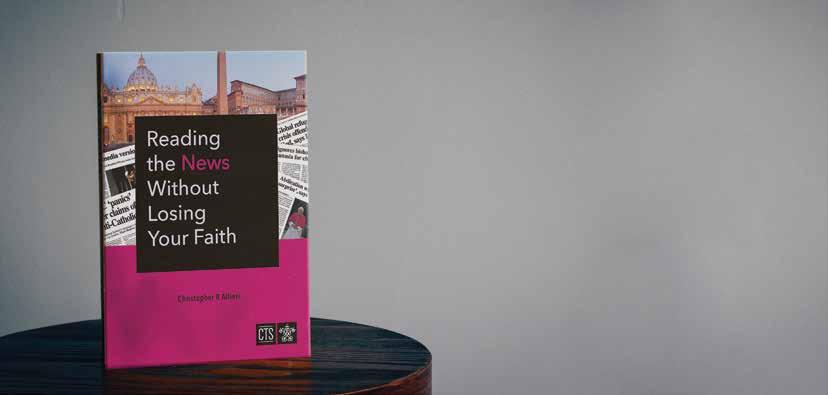
by Christopher Altieri
Evelyn Waugh’s 1938 novel, Scoop is the fictional account of accidental reporter William Boot, sent from England to cover a fictionalized version of the Italo-Abyssinian war. Based on his own experience of covering the actual war, Waugh’s novel is a satirical – even cynical – sendup on journalism’s practices, journalists’ characters, and the economic considerations that drive news coverage. Lord Copper of The Daily Beast, the editor who deployed Boot, was hopeful for “a very promising war” and wanted “to give it full publicity.” Neither reports of lost lives nor damage done were of any consequence, other than for their ability to increase The Daily Beast’s circulation. Nor was accuracy highly valued: Journalism was less about reporting news than competing for the most compelling scoop, and thus, selling copy.
I was reminded of Scoop by Christopher Altieri’s riveting new book, Reading the News Without Losing Your Faith. “The purpose of newspapers,” the saying goes, “is to sell advertisements.” In our internet and social media age, Altieri notes, “outrage” is a primary means of selling those ads (or inducing those clicks). This is not simply a description of media and its methods for communicating, but rather a sign of our social environment’s general health. And this affects Altieri’s primary concern: news about and within the Church.
Among Altieri’s past journalist bona fides are serving as a long-time worker on Vatican Radio’s English desk, a Rome correspondent for The Catholic Herald and a frequent contributor to Catholic World Report and other Catholic media outlets. From this experience, he gives an inside baseball account of how news happens, even when the reported news does not correspond with the events that gave rise to it.
The bad news is that Altieri confirms impulses observed by Waugh and exaggerated in Scoop. Reading the news is an inexact art because those delivering it are often driven by considerations other than factual accounts. The good news is that Altieri teaches us to develop a critical eye, suggesting helpful practices that assist us, as the title suggests, in reading the news without losing our faith. Examples he uses include, Humanae Vitae’s controversial development, Pope St. John Paul II’s skillful (but imperfect) use of media, and the (sometimes) sketchy coverage of Pope Francis’ (sometimes) difficult off-thecuff comments.
Reading the News Without Losing Your Faith is not an exercise in hand-wringing, however. The author both exposes the malady and proposes the remedy, reminding us that, because we are not saved by the news, neither should we despair over it. We must remember that our hope lies elsewhere, and thus Altieri closes on this hopeful but realistic note:
“The world is fallen. We await fullness of its redemption. We have good days and bad – and there have been some big wins along the way – but the only true and lasting victory belongs to Christ, Our Lord, who conquered sin and death. Most of what we do is muddling . . . and that’s all the more reason to be about it.”
REVIEWED BY DR. KENNETH CRAYCRAFT
Christopher Altieri, Reading the News Without Losing Your Faith (London: Catholic Truth Society, 2021). ctsbooks.org
2022
- Matthew 5:16

